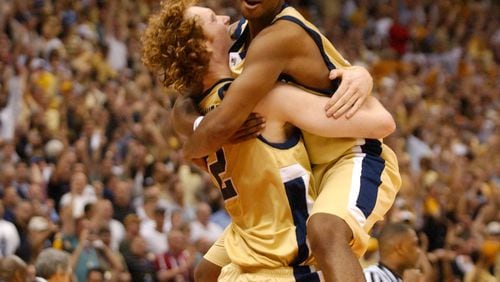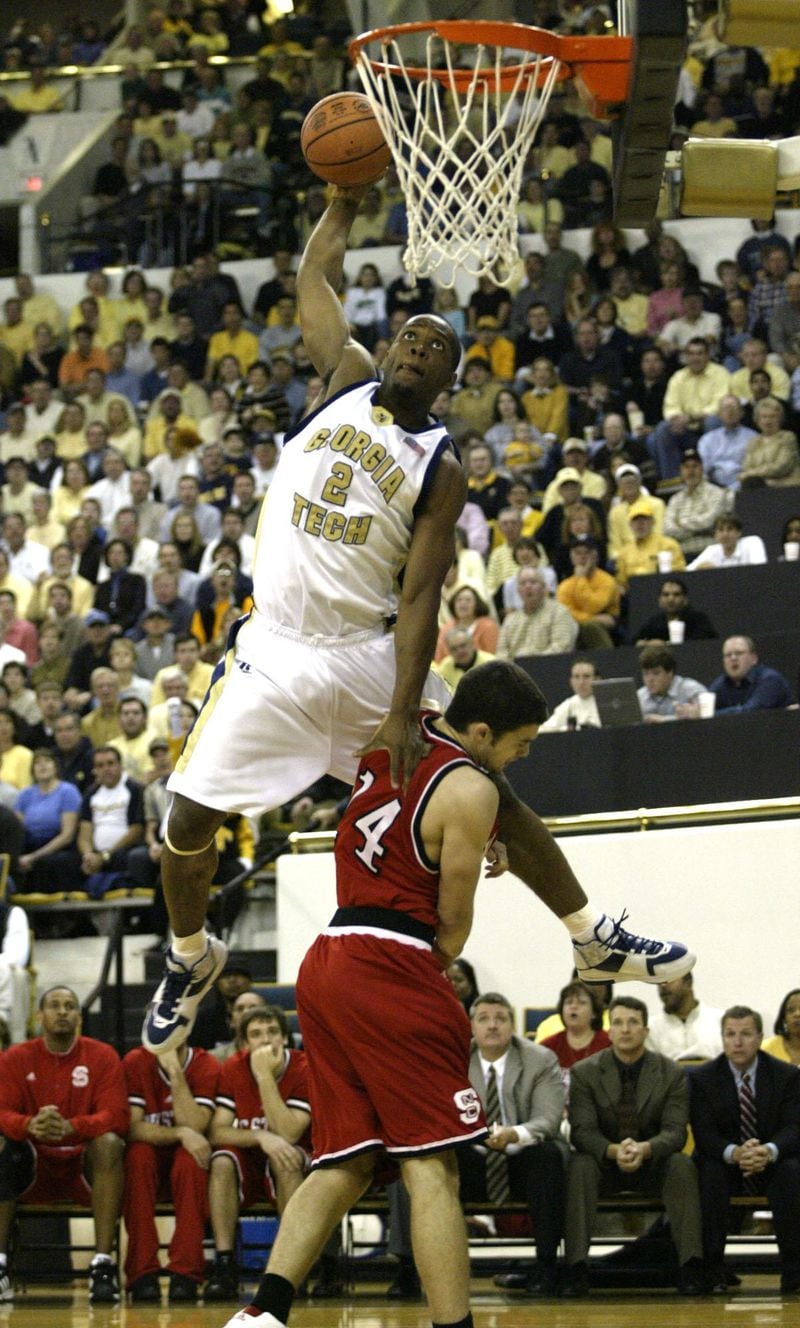Isma'il Muhammad remembers the buzz around Alexander Memorial Coliseum, the Georgia Tech campus and the city of Atlanta.
“I remember anytime we’d go out in the city, anywhere in Atlanta, people would just say, ‘Hey,’ give you a high five or a handshake or say, ‘I love your team,’” said Muhammad, the electrifying guard for the Yellow Jackets’ 2004 Final Four team.
In short, he remembers a version of the Paul Hewitt tenure and of the coach himself different from what has often circulated in the years since.
“It’s a growing frustration throughout all the guys I played with,” he said.
At least partly, it’s likely a result of how Hewitt’s tenure ended. The Jackets made the NCAA tournament four of his first seven seasons, including the magical run to the national championship game in 2004. The Jackets made it back once to the NCAA tournament in Hewitt’s final four seasons and finished under .500 in the other three, prompting his dismissal in March 2011 after 11 seasons and a record of 190-162.
He left owed $7.2 million, the result of a contract that automatically renewed after each season and has constrained Tech’s finances since.
“In my opinion, I think his contract is ultimately what caused so many people angst,” said Dean Keener, a former assistant to Hewitt and a close friend. “I think it’s unfortunate, but I think that’s what’s viewed.”
However, as athletic director Mike Bobinski leads a transition into another era and Hewitt’s time further recede into the past, it’s perhaps worth attempting to consider more than just the end.
“If you’re going to talk about the negative, also talk about the positive,” said former assistant coach Willie Reese, now the basketball coach at Meadowcreek High in Gwinnett County.
Of that, there's considerable material. Hewitt's five NCAA appearances at Tech is tied for 10th most among ACC coaches. The Jackets twice reached the ACC tournament finals. In 2004, they nearly won the national championship, which would have been the first NCAA team championship in school history (not counting the football national championships, which were not sanctioned by the NCAA. The women's tennis team won the NCAA title three years later.).
Tech won 10 of its final 17 games against North Carolina in Hewitt’s tenure. Six players recruited by Hewitt became first-round picks. Eleven made All-ACC and three were named ACC rookie of the year.
Muhammad recalled ending Duke’s 41-game home winning streak in March 2004 and particularly the reception the team received on campus in the middle of the night upon its return. In the 2002-03 season, Tech averaged 8,565 at the coliseum, 93 percent of capacity.
“It was awesome,” Muhammad said. “That’s just really how it was my four years there.”
Credit: Ken Sugiura
Credit: Ken Sugiura
But it has been Muhammad’s experience that those memories have gathered dust. For instance, he said, he and teammates from the 2004 Final Four team have often shared their perception that their team hasn’t been as celebrated as the 1990 “Lethal Weapon 3” Final Four team.
“I try to be a positive guy,” he said. “As you know, your legend grows as time passes. You get better as time goes on, so maybe (it is because) they’re the oldest team.”
The stigma of the low APR score that was handed off from Hewitt to Brian Gregory also rankles those who coached and played during the Hewitt era. The facts of the APR score are incontrovertible – twice, the team’s four-year average of the score that measures retention, eligibility and progress towards graduation were so low that the NCAA docked the team scholarships.
That said, early entries to the draft contributed to the low score. Also, the scores were improving at the time of Hewitt’s departure. In fact, in the 2010-11 academic year, when Hewitt was fired in March and replaced by Gregory later than month, the team earned a perfect single-year score, success that Gregory continued to build on. All players who crossed from Hewitt’s tenure to Gregory’s were eligible. The lost scholarship penalties were both served during Hewitt’s time.
“When you talk about the time period under coach Hewitt, we did a really good job there,” Reese said. “To take somebody to the Final Four in ’04, to put so many guys in the NBA like he did, to mentor guys like he did, then when they talk about coach Hewitt, sometimes what I’m hearing is bad APR, bad APR.”
To Muhammad, the low scores do not tell the entire story of Hewitt’s approach to academics. He recalled how assistant coaches, academic advisers and team managers checked on players to make sure they were in every class.
“Sometimes, they’d come back and make sure no one tried to get sneaky and leave,” he said.
If a single player skipped a class, the entire team was required to show up the next morning to run timed wind sprints for 30 minutes. Muhammad recalled once that, when a player missed a class, Hewitt flew back into town from a recruiting trip to supervise the wind sprints and then flew back out.
“So if someone says he doesn’t care about academics, I don’t know about that,” said Muhammad, the owner of a Tech management degree. After a lengthy international career, Muhammad is an executive recruiter at Barton Executive Search.
The NCAA sanctions committed during Hewitt’s time – stemming from an academic advisor and former graduate assistant attending an AAU tournament held at Tech – seem benign. The school argued that no advantage had been gained. The NCAA saw differently, but the penalties for the basketball team were rather tame.
“People tend to remember what you’ve done recently,” Keener said. “And more than ever, that’s the world of instant gratification. I think they tend to remember the last three or four years instead of the entire body of work.”
It’s possible that had Gregory had been able to lead Tech to the postseason quickly, as Hewitt did after Bobby Cremins’ difficult finish (three losing seasons in his final four – the same, coincidentally, as Hewitt), fans might have been able to put aside their frustration with the close of Hewitt’s tenure. And the odd thing about holding Hewitt responsible for his contract – who wouldn’t sign a contract like that?
The start of a new coaching tenure at Tech – just the fourth in Tech’s ACC era – will put Hewitt’s time further into the distance. Those associated with Hewitt’s time hope that perhaps it will elucidate a broader perspective on those 11 years. Keener wondered aloud how Hewitt would be received were he to return to McCamish Pavilion for a game.
“And here’s my response to that,” he said. “Why wouldn’t every fan stand up and applaud?”
About the Author







